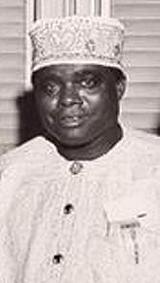Jaja Wachuku | |
|---|---|
 | |
| Minister for Foreign Affairs and Commonwealth Relations | |
| In office 1961–1965 | |
| Prime Minister | Abubakar Tafawa Balewa |
| Preceded by | position established |
| Succeeded by | Nuhu Bamalli |
| Ambassador of Nigeria to the United Nations | |
| In office 1960–1961 | |
| Governor‑General | Nnamdi Azikiwe |
| Prime Minister | Abubakar Tafawa Balewa |
| Preceded by | position established |
| Succeeded by | Muhammed Ngileruma |
| Speaker of the House of Representatives of Nigeria | |
| In office 1959–1960 | |
| Prime Minister | Abubakar Tafawa Balewa |
| Preceded by | Sir Frederic Metcalfe |
| Succeeded by | Ibrahim Jalo Waziri |
| Senator Representing Aba Zone Nigeria | |
| In office 1 October 1979 – 1 October 1983 | |
| Preceded by | position established |
| Succeeded by | Position abolished |
| Personal details | |
| Born | 1 January 1918 Nbawsi, Southern Region, British Nigeria (now in Abia State, Nigeria) |
| Died | 7 November 1996 (aged 78) Enugu, Nigeria |
| Political party | National Council of Nigeria and the Cameroons; Nigerian People's Party |
| Spouse | Rhoda Idu Oona Onumonu |
| Alma mater | Trinity College Dublin, Ireland |
| Profession | Lawyer |
Jaja Anucha Ndubuisi Wachuku // (1 January 1918[1][2] – 7 November 1996) was a Pan-Africanist[3] and a Nigerian statesman, lawyer, politician, diplomat and humanitarian. He was the first Speaker of the Nigerian House of Representatives;[4] as well as the first Nigerian Ambassador and Permanent Representative to the United Nations.[5] Also, Wachuku was the first Nigerian Minister for Foreign Affairs.[6] Notably, Wachuku was a Royal Prince of Ngwaland, "descendant of 20 generations of African chiefs in the Igbo country of Eastern Nigeria".[7]
Wachuku, who was "widely respected" as Foreign Affairs Minister of Nigeria intervened with the South African government and helped save Nelson Mandela and others from the death penalty at the 1963–64 Rivonia Trial.[8] In his 1962 diary, from Lagos: Nigeria, Nelson Mandela wrote: "Friday 18 May 1962: 1pm: We meet Mr Jaja Wachuku and his staff and have a profitable discussion. Saturday 19 May 1962: We have lunch with Jaja Wachuku."[9]
On Thursday 30 September 2010, President Goodluck Jonathan of Nigeria conferred on Wachuku a posthumous special Golden Jubilee Independence Anniversary Award for his outstanding contributions towards the development of Nigeria.[10] Also, for the 1 January 2014 100-year anniversary of Nigeria, having been nominated for exceptional recognition by the Presidential Committee on the Centenary Celebrations, Wachuku was, on Friday 28 February 2014, honoured as a Hero of the Struggle for Nigeria's Independence from Great Britain and a Pioneer Political Leader by President Goodluck Jonathan.[11][12]
On Friday 6 March 2020, Ireland's Trinity College Dublin honoured Wachuku with a prominent portrait placed within the university's Historical Society; where Wachuku graduated in 1944 with first class honours degree in Legal Sciences; and was a member of College Historical Society.[13][14][15]
- ^ Alayande, Lanre (2010). Our Rainmaker. iUniverse. ISBN 9781450206082.
- ^ Ibe N. A. Okochi, Nigeria's African Policy, Cross Continent Press, 1990, p. 17.
- ^ Ras Makonnen; Kenneth King, Pan-Africanism from within, Oxford University Press, 1973.
- ^ Cite error: The named reference
RussianHoewas invoked but never defined (see the help page). - ^ "Appendix v: Delegations to the General Assembly and the Councils | Delegations to Sixteenth Session of General Assembly". Yearbook of the United Nations 1961. Office of Public Information (Report). United Nations. 31 December 1961. p. 743. Retrieved 1 November 2020.
- ^ Emeka Anyaoku, The Missing Headlines: Selected Speeches, Liverpool University Press, 1997, p. 441.
- ^ Cite error: The named reference
Time1961was invoked but never defined (see the help page). - ^ Cite error: The named reference
Broun111was invoked but never defined (see the help page). - ^ Nelson Mandela, Mandela Diary: 1-31 May 1962, South African History Online, 2018, p.3.
- ^ "FG Honours Azikiwe, Balewa, Obasanjo, Adenuga, 47 Others" Archived 17 July 2011 at the Wayback Machine, ThisDay Live, 28 September 2010.
- ^ "Centenary: Jonathan To Honour Queen Elizabeth II, Lugard, Abacha, IBB, Buhari, OBJ & Many More" Archived 31 March 2014 at the Wayback Machine, The Niger Times.
- ^ List of Centenary Honours Award Recipients Archived 13 February 2018 at the Wayback Machine, Nigeria Centenary Blog, 24 February 2014.
- ^ Pollak, Sorcha (6 March 2020). "Former tánaiste recalls how she was refused entry to all-male club". The Irish Times. Retrieved 15 May 2023.
The five portraits painted by Irish artist Mick O'Dea feature Trinity graduates Conor Cruise O'Brien, Frederick Boland, Owen Sheehy Skeffington, Mary Harney and Jaja Wachuku, Nigeria's first foreign minister.
- ^ Geoghegan, Patrick (16 February 2020). "The Hist': 250 years of self-indulgent theatrics and transformative debate". The Irish Times. Retrieved 15 May 2023.
Behind the scenes, another former Trinity debater, the Nigerian foreign minister, Jaja Wachuku, persuaded the British and US governments to intervene. Wachuku, who wore his Trinity College tie at cabinet meetings, had been a leading member of the College Historical Society in the 1940s, where he won a medal for oratory. Wachuku was honoured posthumously as a "hero of the struggle for Nigeria's independence" who helped persuade competing factions to press for independence in 1957.
- ^ "Portrait Unveiling: Programme: Hist250: 1770-2020: Trinity College Dublin: Jaja Wachuku". Trinity College Dublin: University of Dublin: Ireland. Archived from the original on 18 October 2020. Retrieved 19 May 2020.